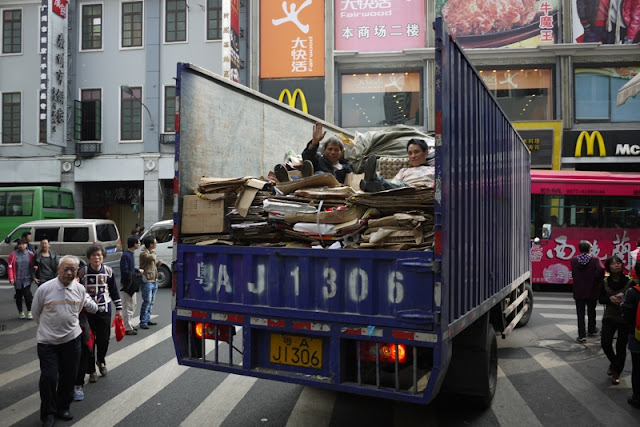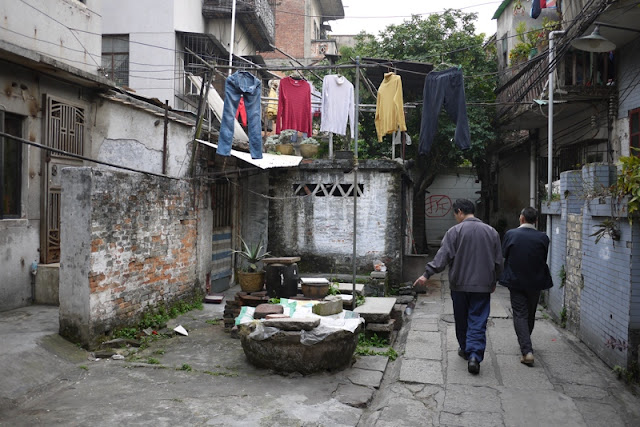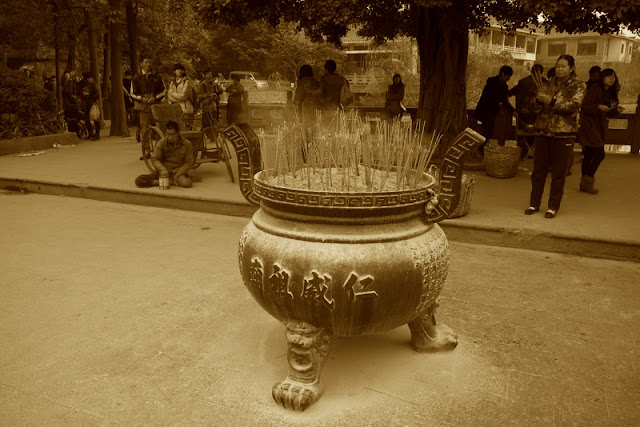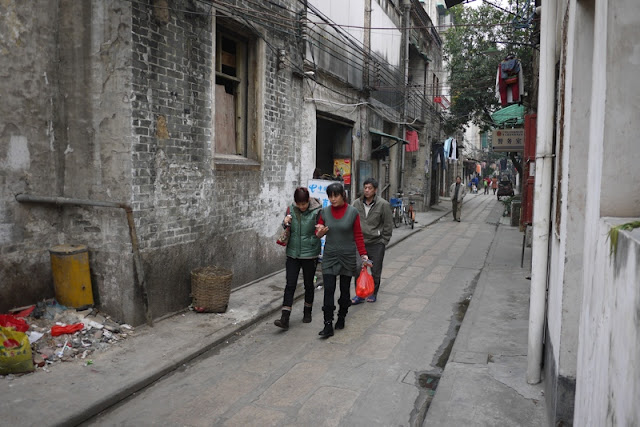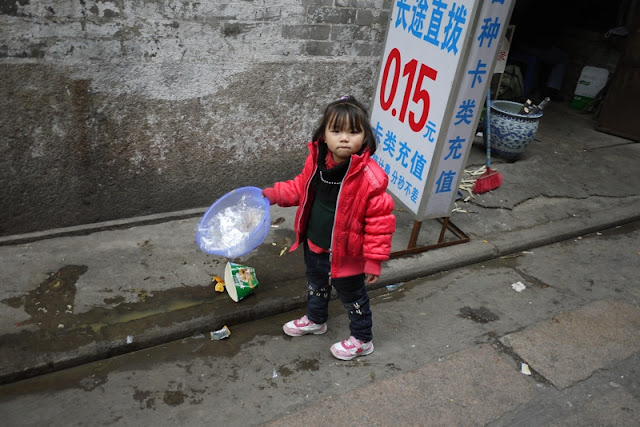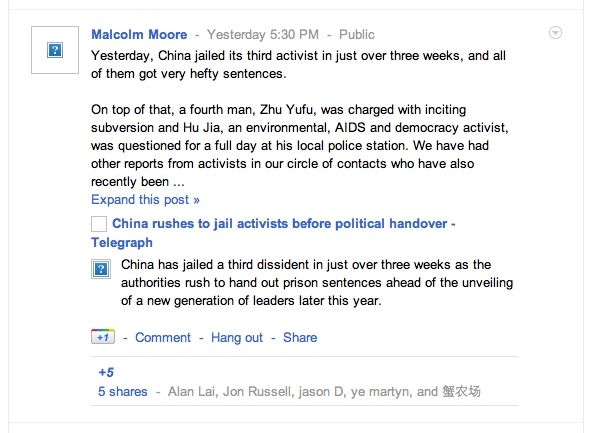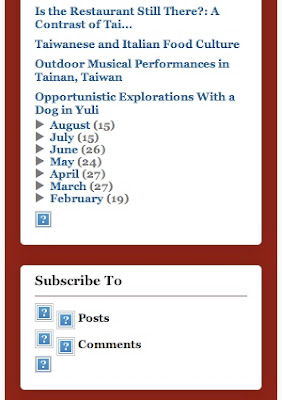China's blocking of numerous sites with its "Great Firewall" has been the subject of much attention here, but I haven't touched on the subject recently. So I decided to conduct some "tests" in order to get a sense of current conditions in China for accessing a variety of major websites. As publicly available in-depth reports on the topic are hard to find, I am happy to share what I've found. While I've noticed that an earlier post of mine on the accessibility of Google+ in China was cited in testimony (see
here) provided to the
The Congressional-Executive Commission on China in the U.S., my primary goal is simply to help readers who are outside of China better appreciate the online experience of website blocking in China. It's often not as clear cut as some may expect.
While there exist several websites that provide the status of websites' accessibility in China, I felt it was worth undertaking my own exploration since none of those services (as far as I am aware) examine whether any blocking is only occurring at the DNS level. This is an important distinction since DNS-blocking is usually very easy to overcome (for some links to information about DNS-blocking see
here). Also, DNS-blocking
may suggest that China is not fully concerned about the website or that a "formal" decision to block the site has not been made. Other potential problems with using semi-automated websites include their apparent inabilities to test internal pages of sites requiring a login (particularly relevant for many social networking services) and to distinguish cases between a website being significantly slowed or disrupted instead of being fully blocked.
I conducted the tests on January 21 and January 23 while in Guangzhou, China. On each day every website was tested under each of these conditions: using default locally available DNS servers; using non-China-based DNS servers; using a VPN (while also using a non-China-based DNS server). Therefore, every website was tested at least 6 times in total. After changing DNS settings, I deleted all Internet cookies in the browser and rebooted the computer (there are methods for changing DNS settings which should not require rebooting, but I've found them to be less than 100% reliable).
When using a VPN, which can be used to "get through" China's Great Firewall and allow a user to access the Internet as if they were outside of mainland China, all of the reported websites responded normally. This suggests that the problems I observed while not using a VPN were not due to general problems with the websites or my computer. All results reported below are from conditions where a VPN was not used (the "normal" situation for many in China).
First I'll present sites that were completely inaccessible. Second, I'll present sites that were fully accessible. Third, I'll present sites that weren't fully blocked, but did not load normally.
Unlike explorations I conducted last year (see
here for the most recent prior tests I conducted on Google+), I noticed no apparent differences for any of the tested websites when using a local versus non-local DNS server. I also found no obvious differences in any site's performance between the two days of testing. Therefore, all results that follow are collapsed across those two conditions.
Sites I could not access from China:
Facebook, Twitter, Vimeo, YouTube
None of these services were accessible. In all cases there was a definitive failed response after some period of time (and not an indefinite wait with no response). Based on previous reports & experience, there are no surprises here as all of these services have been known to be blocked in China.
Sites I could access from China without problem:
eBay -- eBay's U.S. website loaded very quickly on a consistent basis and no problems were seen. Because of this, I used it as a baseline in comparing other sites. If another site loaded slowly, I could use eBay to demonstrate that the problem wasn't due to general slowness in the Internet connection or in connecting to web sites outside of China.
Amazon China -- The Chinese version of Amazon's site loaded very quickly, and I never noticed a problem.
Windows Live & MSN -- I had no problem logging into or using Live (including Hotmail and browser-based Messenger) and MSN.
NPR -- Again, I had no problem accessing the site nor in listening to its streaming audio reports.
Sites I could access, but with problems:
Google+ and Gmail -- My post from last summer "
Access to Google+ in China" includes reports from more than 10 days up until the beginning of August. It indicates that DNS-blocking of Google+ appears to have become the norm during the period of testing. However, in the current testing Google+ was not blocked, although sometimes logging in or accessing new information could require waiting several minutes or reloading the page. On one occasion, images (not including Google's icons) wouldn't appear, either in the streams or pages dedicated for photos. Here's an example of
a public post by journalist Malcolm Moore when no images were appearing:
It's worth noting that article referenced in the post, "China rushes to jail activists before political handover", was available in China, although the sidebar content on The Telegraph took significantly longer to load than the main content.
Gmail was similar to Google+. I could access it but sometimes I needed to wait for a period of time to access new information. Additionally, Google Chat would occasionally loose connection (I've heard friends in China regularly report a similar experience).
So, both Google+ and Gmail could be a pain to use at times (and sometimes they had no problems at all) but they never appeared to be fully blocked.
Yahoo! -- Yahoo! presented one of the more interesting cases. When first accessing the main page at www.yahoo.com it took approximately 9 minutes for the page to load. That length of time was very consistent across several testings. When the page finally did load it was not rendered correctly as seen here in three screen shots of sections from the same page:
 |
| Top of main page for Yahoo! |
 |
| This column of icons continued at great length |
 |
This content also rendered incorrectly and should appear near the top.
Instead, it followed pages and pages of the icons seen in the previous photo. |
However, there was no problem accessing other sites at Yahoo! such as news.yahoo.com or mail.yahoo.com. On several occasions the main page would correctly load after first waiting for the incorrectly rendered Yahoo! main page to load and either 1. reloading the page or 2. going to another Yahoo! site & then returning the main page. However, this behavior was not consistent and sometimes another 9 minutes would be needed for the main page to reload.
Amazon.com -- Typically, the first time trying to access Amazon's U.S. website led to complete failure. However, a reload would cause the main page to quickly appear. The site would typically be usable for a period of time then occasionally it would become temporarily inaccessible again. Such behavior never occurred on Amazon's China-based site.
Bing -- Microsoft's Bing performed without problem. However, on one occasion it became inaccessible for several minutes. I was not able to replicate the experience.
CNN -- A quick overview of CNN indicated no problems except that all videos and video sections of the website would not load.
This blog: Isidor's Fugue -- Similar to the main page of Yahoo!, this blog wasn't blocked but is rendered incorrectly. For example, all of the non-post content on the right side of the page incorrectly appears at the end of all posts on the page. Additionally, some of the space between lines of text is compressed as seen here:
...
Also, for the "Blog Archive" normally only the most recent month's posts appear without clicking on the triangle figures. However, as seen above other months (but not all) appeared as well. Additionally, it is typical that some of the images in posts will not not appear (all images are hosted by Google). A refresh of the page can cause missing images to appear, but then sometimes others images will not load. I'm not aware of any pattern other than that I have yet to see every photo successfully load and the banner photo never loads. That some likely explains why I have data indicating that it's not uncommon for visitors from China to reload pages.
I should note that I don't think any of the interference is directed specifically at the blog but is instead due to it being hosted on Google's service Blogger. However, I haven't yet specifically tested this.
Conclusion:
If there's only one thing I could say, it would be that accessibility of sites in China isn't as simple as "yes" or "no". It's much more nuanced as seen in the last set of sites presented above. This means that checking automated reports of a website's accessibility in China won't necessarily provide key details. For example, my ability to use Google+ stands in contrast to the status at the time for plus.google.com on
greatfirewallofchina.org (failed for 5 locations in China, but none are Guangzhou) and
websitepulse.com (failed for Guangzhou). This isn't the only difference I've found (they also list Yahoo! as ok). They may be due to testing/reporting methods used or variations, especially in DNS-blocking, in different locations in China (it's also
possible that the Great Firewall engages in user-specific blocking based on a variety of factors). While I suspect location is not the main explanation for many (if not all) of the differences if found, I can make no strong claim at the moment as to whether I would find similar results if I were in other locations in China. Ideally, people would conduct identical tests at the same time on multiple occasions in several locations. Well, actually... ideally the Chinese government would provide an explanation of what they were doing.
How are the peculiar results for some of the sites caused? In large part due to the variety of the results found and the complexity of the various technologies possibly involved, I'm not now able to provide any certain answers. I'd certainly welcome input from readers.
Why would the Great Firewall only partially interfere with a website? In some cases, the Chinese government's goals may be best met by not fully blocking a website, but merely making it sufficiently annoying to use so people are disuaded from using it. Other cases may be a result of no clear or country-wide directive existing as to whether a particular website should be blocked. But I also suspect that not all interference is necessarily intended and some of it may instead be "leftovers" of past actions by the Great Firewall or the result of actions not targeted towards the site in question. That the Great Firewall may behave in such a "messy" manner comes as no great surprise. For a more in-depth discussion on the workings of the Great Firewall see an in-depth article by James Fallows
here.
Finally, although there was a crackdown on VPNs in China last year, recently I have had no problem using a VPN and all sites loaded normally while using it. I'll have more to say on the VPN issue in a later post. I've noticed a curious pattern of results there, too.

